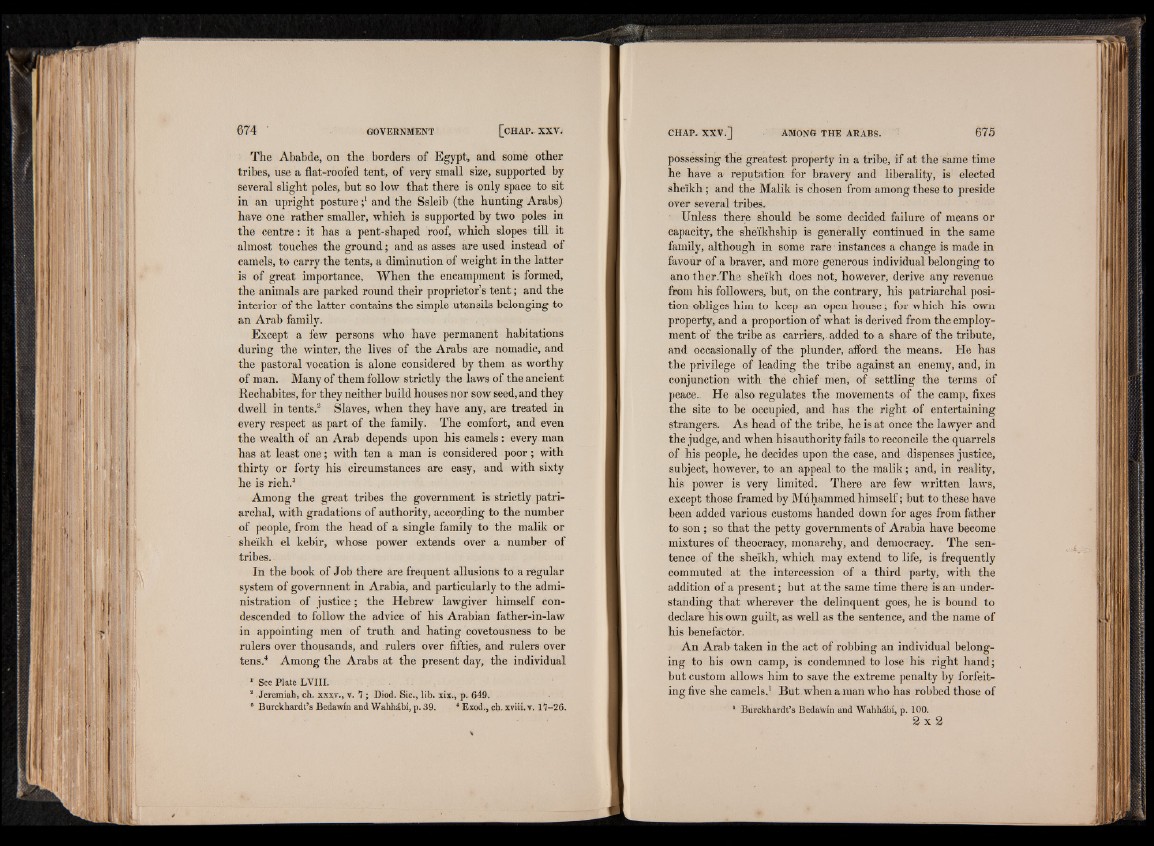
The Ababde, on the borders of Egypt, and some other
tribes, use a flat-roofed tent, of very small size, supported by
several slight poles, but so low that there is only space to sit
in an upright postureand the Ssleib (the hunting Arabs)
have one rather smaller, which is supported by two poles in
the centre: it has a pent-shaped roof, which slopes till it
almost touches the ground; and as asses are used instead of
camels, to carry the tents, a diminution of weight in the latter
is of great importance, When the encampment is formed,
the animals are parked round their proprietor’s tent; and the
interior of the latter contains the simple utensils belonging to
an Arab family.
Except a few persons who have permanent habitations
during the winter, the lives of the Arabs are nomadic, and
the pastoral vocation is alone considered by them as worthy
of man. Many of them follow strictly the laws of the ancient
Rechabites, for they neither build houses nor sow seed, and they
dwell in tents.2 Slaves, when they have any, are treated in
every respect as part of the family. The comfort, and even
the wealth of an Arab depends upon his camels : every man
has at least one; with ten a man is considered poor; with
thirty or forty his circumstances are easy, and with sixty
he is rich.3
Among the great tribes the government is strictly patriarchal,
with gradations of authority, according to the number
of people, from the head of a single family to the malik or
sheikh el kebir, whose power extends over a number of
tribes.
In the book of Job there are frequent allusions to a regular
system of governnent in Arabia, and particularly to the administration
of justice; the Hebrew lawgiver himself condescended
to follow the advice of his Arabian father-in-law
in appointing men of truth and hating covetousness to be
rulers over thousands, and rulers over fifties, and rulers over
tens.4 Among the Arabs at the present day, the individual
1 See Plate LVIII.
s Jeremiah, ch. xxxv., v. 7 ; Diod. Sic., lib. xix., p. 649.
8 Burckhardt’s Bedawin and Wahhábí, p. 39. * Exod., ch. xviii. v. 17-26.
possessing the greatest property in a tribe, if at the same time
he have a reputation for bravery and liberality, is elected
sheikh; and the Malik is chosen from among these to preside
over several tribes.
Unless there should be some decided failure of means or
capacity, the she'ikhship is generally continued in the same
family, although in some rare instances a change is made in
favour of a braver, and more generous individual belonging to
another.The sheikh does not, however, derive any revenue
from his followers, but, on the contrary, his patriarchal position
obliges him to keep an open house; for which his own
property, and a proportion of what is derived from the employment
of the tribe as carriers, added to a share of the tribute,
and occasionally of the plunder, afford the means. He has
the privilege of leading the tribe against an enemy, and, in
conjunction with the chief men, of settling the terms of
peace.. He also regulates the movements of the camp, fixes
the site to be occupied, and has the right of entertaining
strangers. As head of the tribe, he is at once the lawyer and
the judge, and when his authority fails to reconcile the quarrels
of his people, he decides upon the case, and dispenses justice,
subject, however, to an appeal to the malik; and, in reality,
his power is very limited. There are few written laws,
except those framed by Muhammed himself; but to these have
been added various customs handed down for ages from father
to son ; so that the petty governments of Arabia have become
mixtures of theocracy, monarchy, and democracy. The sentence
of the sheikh, which may extend to life, is frequently
commuted at the intercession of a third party, with the
addition of a present; but at the same time there is an understanding
that wherever the delinquent goes, he is bound to
declare his own guilt, as well as the sentence, and the name of
his benefactor.
An Arab taken in the act of robbing an individual belonging
to his own camp, is condemned to lose his right hand;
but custom allows him to save the extreme penalty by forfeiting
five she camels,1 But when a man who has robbed those of
1 Burckhardt’s Bedawin and Wahhabi, p. 100.
2 x 2